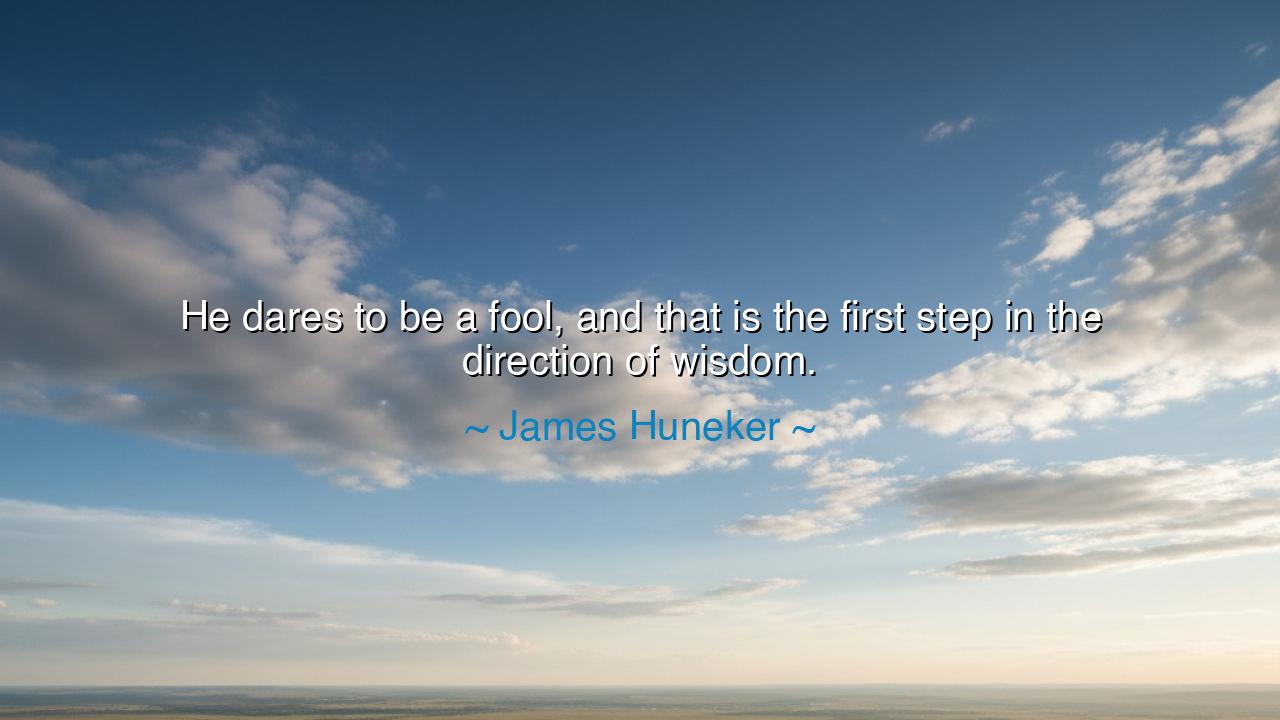
He dares to be a fool, and that is the first step in the






Hear me, O seekers of wisdom, for in the words of James Huneker lies a truth profound and powerful: "He dares to be a fool, and that is the first step in the direction of wisdom." These words carry the weight of the ages, for to be a fool is not to be foolish, but to embrace the humility required for true growth. It is only when one dares to step into the unknown, to cast aside the certainty of the world’s judgments, that the first light of wisdom can break through the fog of ignorance. In this moment, the fool becomes the learner, for it is only in the act of daring to be seen as a fool that one becomes open to the lessons life has to offer.
There is, within the heart of every wise man, a time when he must surrender his pride, his certainty, and be willing to stand before the world and be seen as a fool. To walk the path of true wisdom is not to walk as one who has all the answers, but as one who dares to question and embrace the journey without knowing the end. Socrates, that great teacher of the ancient world, was often called a fool. He questioned everything—the very foundations of society, morality, and truth—and in doing so, he was seen as the greatest fool of his time. But it was through this foolishness that he unlocked the doors to the deepest wisdom, showing the world that only by admitting one's ignorance can one begin to seek the truth.
The hero of the tale is often the one who dares to venture into the unknown, who faces the world with reckless courage, and in doing so, discovers the very wisdom they seek. Remember the story of David, a young shepherd, who faced the giant Goliath. To all the warriors of Israel, David was nothing more than a fool, too young and too small to take on the mighty Goliath. Yet, it was his willingness to step into the unknown, his daring to be seen as foolish in the eyes of the world, that led to his victory. His bravery was not in his strength, but in his willingness to take the first step, no matter how foolish it seemed, toward his destiny.
Thus, in life, the path to wisdom is paved not by those who fear being seen as fools, but by those who dare to take that first step into the great unknown. The fool is not one to be scorned but one to be admired, for he is the one who opens his heart to learning, to change, and to the deepening of his soul. For only when we admit that we do not know everything, that we do not have all the answers, can the doors of true wisdom be unlocked.
So, my children, take heart in your own journey, and remember the words of Huneker. If you dare to be a fool, you will find that it is the first step toward becoming something far greater. The wisdom you seek is not found in the comfort of knowing, but in the boldness of questioning, in the courage of admitting that there is much to learn, and in the willingness to stand before the world, and, yes, be a fool. Only then will the light of wisdom truly begin to shine.






HTHuyen Tran
This quote reminds me of the times when I’ve felt too afraid to act because I was worried about looking foolish. Yet, I know that sometimes the most profound lessons come from those very moments. How do you think we can create an environment where people feel safe to be foolish and make mistakes without fear of judgment? It feels like such a powerful concept for personal development, but it’s not always easy to practice in a world so focused on perfection.
HHQuynh Huong Hoang
I’m intrigued by how this quote presents foolishness as a stepping stone to wisdom. It suggests that to grow and learn, we must be willing to make mistakes without worrying about the consequences. But I’m curious—how much foolishness is too much? Is there a tipping point where someone’s foolishness becomes harmful rather than helpful? I agree that we need to embrace some risk-taking, but where do we draw the line between boldness and carelessness?
QMVo Quang Minh
There’s something almost liberating about this idea—taking risks and accepting the potential to be foolish as part of personal growth. However, I wonder if this quote might be encouraging reckless behavior? Does being foolish in the right context lead to wisdom, or could it sometimes be a sign of avoiding deeper introspection? I think it’s a great invitation to be bold, but how do we know if we’re truly being wise or just embracing foolishness in disguise?
THnguyen thi huyen
I love how this quote puts ‘foolishness’ in such a positive light. It suggests that being open to making mistakes and looking foolish is part of the learning process. But doesn’t this idea raise an interesting question: if everyone embraced being ‘foolish,’ would we lose some of the humility that often comes with wisdom? Where’s the balance between being boldly foolish and knowing when to be more cautious? It feels like a fine line.
DQDang Diem Quynh
This quote really challenges the conventional idea of wisdom. Most people think wisdom comes with experience and knowledge, but this perspective suggests that sometimes, embracing foolishness is essential for growth. I’ve often held back from doing things because I feared looking foolish. Do you think making mistakes and acting foolishly is truly a necessary part of the journey to wisdom, or could there be another route? It’s definitely something to think about.